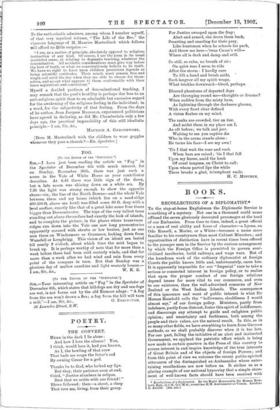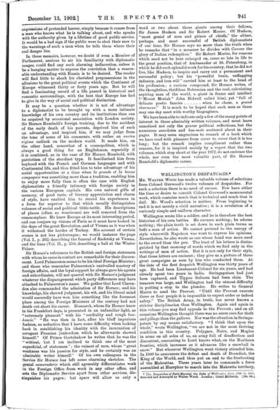BOOKS.
RECOLLECTIONS OF A DIPLOMATIST.*
To the stay-at-home Englishman the Diplomatic Service is something of a mystery. Not one in a thousand could name offhand the seven gloriously decorated personages at the head of our Embassies. From time to time, indeed, a great official or a man of real ability and force of character—a Lyons, an Odo Russell, a Morier, or a White—becomes a name more familiar to his countrymen than most Cabinet Ministers ; and opportunities of distinction have in recent times been offered to the younger men in the Service by the curious arrangement by which the Foreign Office is permitted to govern semi- civilised territories, build railways, and wage wars. But of the humdrum work of the ordinary diplomatist at foreign Courts the public knows little and, unfortunately, cares less. It is apparently impossible for our "Imperial" race to take a serious or connected interest in foreign policy, or to realise that upon the proper conduct of our foreign relations depend issues far more vital to our commerce, and even to our existence, than the well-advertised concerns of New Zealand or the West Indian Islands. The consequence of this ignorance and want of public interest is what Sir Horace Rumbold calls the "hollowness, shoddiness I would almost say," of our foreign policy. Ministers, partly from indolence, partly from distrust, foster this spirit of indifference, and discourage any attempt to guide and enlighten public opinion; and uncertainty and feebleness, both among the people and their rulers, are the natural result. In this, as in so many other fields, we have everything to learn from German methods, as we shall probably discover when it is too late. For our part, failing the initiative of an alert and instructed Government, we applaud the patriotic effort which is being now made in certain quarters in the Press of this country to arouse interest in and inspire knowledge of the true interests of Great Britain and of the objects of foreign Powers ; and from this point of view we welcome the recent public-spirited utterances of the distinguished ex-Ambassador whose enter- taining recollections are now before us. It strikes us as a glaring example of our national hypocrisy that a simple state- ment of well-known facts should have been received with
• Recollections of a Diplomatist. By the Right Honourable Sir Horace Rum. bold, Bart., H.C.B., G.E.N.G., sometime MX. Ambassador at Vienna. London: E. Arnold. [25e. net.1
expressions of pretended horror, simply because it comes from a man who knows what he is talking about, and who speaks with the authority given by a lifetime of good public service. It would be a bad sign if the public were to shut their ears to the warnings of such a man when he tells them where their real danger lies.
In these memoirs, however, we doubt if even a Member of Parliament, anxious to air his familiarity with diplomatic usages, could find any such alarming indiscretion, unless it be a hanging matter to express the conviction that a reason- able understanding with Russia is to be desired. The reader -will find little to shock his cherished prepossessions in the allusions to the great political events which the Continent of Europe witnessed thirty or forty years ago. But he will find a fascinating record of a life passed in historical and romantic surroundings, with the best that Europe has had to give in the way of social and political distinction.
It may be a question whether it is not of advantage to a diplomatist to be brought up with a more intimate knowledge of his own country and its institutions than can be acquired by occasional association with London society. Sir Horace Rnmbold's foreign training, due to the accident of the early death of his parents, deprived him of such an advantage, and inspired him, if we may judge from the tone of some of his comments, with rather an ancien regime outlook on the modern world. It made him, on the other hand, somewhat of a cosmopolitan, which is .always a good thing for an Englishman, especially if it is combined, as in the case of Sir Horace Rumbold, with patriotism of the sturdiest type. It familiarised him from boyhood with the French and German languages and with Continental life, and thus fitted him to take advantage of his social opportunities at a time when la grande et la bonne compagnie was something more than a tradition, enabling him to enjoy more fully than is often the case with English diplomatists a friendly intimacy with foreign society in the various European capitals. His own natural gifts of memory, of good taste, of literary appreciation and charm of style, have enabled him to record his experiences in a form far superior to that which usually distinguishes volumes of social and political tittle-tattle. His descriptions -of places (often so wearisome) are well removed from the commonplace. He knew Europe at its most interesting period, and can conjure up visions of Paris as it must have looked in the days of the great Revolution, and of Vienna as it was when it withstood the hordes of Turkey. His account of certain scenes is not less picturesque ; we would instance the page (Vol. I., p. 262) describing the funeral of Radetsky at Vienna, and the lines (Vol. II., p. 254) describing a ball at the Winter Palace.
Sir Horace's references to the British and foreign statesmen with whom he came in contact are remarkable for their discern- ment. Lord Palinerston seems to be his ideal Foreign Minister; and those who remember Palmerston's unrivalled mastery of ioreign affairs, and the loyal support be always gave his agents and subordinates, will not quarrel with Sir Horace's judgment whatever the disparagement which party differences may have attached to Palmerston's name. We gather that Lord Claren- don also commanded the admiration of Sir Horace; and his knowledge, his shrewd judgment, his wit, and his liberal mind. would assuredly have won him something like the foremost place among the Foreign Ministers of the century had not death out short his career. Bismarck, whom Sir Horace knew in his Frankfort days, is presented in an unfamiliar light, as 'extremely pleasant" with his "cordiality and rough bon- : .homie." "He was then in fact, after his bluff imperious fashion, so seductive that I have some difficulty when looking .back in establishing his identity with the incarnation of arrogant Prussian junkerdom which he afterwards showed himself." Of Prince Gortchakow he writes that he was the " wittiest, but I am inclined to think one of the most superficial, of statesmen '? ; the vainest of men, whose "great -weakness was his passion for style, and he certainly was an admirable writer himself." Of his own colleagues in the 'Service Sir Horace has left some charming sketches. The genial camaraderie which still agreeably differentiates work in the Foreign Office from work in any other office, and sets the Diplomatic Service apart from other services, dis- tinguishes his pages ; but space will allow us only a word or two about those giants among their fellows, Sir James Hudson and Sir Robert Morier. Of Hudson, "most genial of men and Prince of chiefs," the ablest, perhaps, and most successful of British diplomatists of our time, Sir Horace says no more than the truth when he remarks that "in a measure he divides with Cavour the glory of Italian redemption." Sir Robert Morier, for reasons which need not be here enlarged on, came so late in life to the great position, that of Ambassador at St. Petersburg, in which he did such splendid work for his country, that he did not live, like Hudson, to inspire and carry out a permanent and successful policy ; but his "powerful brain, unflagging industry, and iron will" carried him at least to the head of his profession ; a curious compound, Sir Horace writes, of the thoughtless, thriftless Bohemian and the cool, calculating aspiring man of the world, a giant in frame and intellect (" Mount Moriah " John Bidwell called him), yet "full of delicate poetic fancies when he chose, a grand char-incur." It is much to be hoped that such men as these may one day meet with worthy biographers.
We have been able to indicate only a few of the many points of interest in these admirably written volumes, and must leave unnoticed not only the graver political reflections, but the numerous anecdotes and boa .motsscattered about in their pages. It may seem ungracious to remark of a book which we have read with pleasure from cover to cover that it is too long ; but the remark implies compliment rather than censure, for it is inspired mainly by a regret that the two volumes, which stop short at the year 1872, do not embrace the whole, nor even the most valuable part, of Sir Horace Rumbold's diplomatic career.



















































 Previous page
Previous page